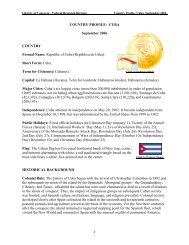1 - American Memory
1 - American Memory
1 - American Memory
You also want an ePaper? Increase the reach of your titles
YUMPU automatically turns print PDFs into web optimized ePapers that Google loves.
25<br />
Unless we do something now to protect the public interest during a<br />
shipping stoppage, Hawaii will receive one crippling blow after an-<br />
other to its economic lifeline * * * the effect of which will be a long<br />
term loss of confidence in the viability of our State economy. And when<br />
we speak of the effect upon the economy we are not talking only about<br />
protecting the profits of the businessmen. We are talking about people,<br />
their jobs, their standard of living, and their entire quality of life—<br />
all these things that are dependent upon a well-nourished economy.<br />
There is a saying that half a loaf is better than none.<br />
But why should the people of Hawaii settle for a half-loaf economy<br />
when it is within the power of their government to insure the whole<br />
loaf through legislation such as House bill 7189 ?<br />
Since "World War II, our group of islands has been devastated by<br />
a series of shipping stoppages. Seven major strikes have closed down<br />
west coast and/or Hawaiian ports for a total of 594 days since 1946.<br />
The first of these crippling strikes was a west coast shipboard union<br />
strike which started October 1946 and continued for 53 days. A similar<br />
strike starting in September 1948 continued for 96 days. Then came<br />
the devastating 177 day ILWTI Hawaii dock strike from May 1<br />
through October 25,1949, the longest and most severe of all the strikes<br />
which have affected Hawaii and its people.<br />
The fourth shipping stoppage was by the Sailors Union of the<br />
Pacific and closed ports for 66 days in 1952. Ten years later, in 1962,<br />
a west coast shipboard union strike shut down ports for 27 days.<br />
During this strike, the Governor of Hawaii declared a state of emer-<br />
gency after 22 days of total paralysis, and President Kennedy invoked<br />
provisions of the Taft-Hartley Act to send the seamen back to work.<br />
The matter was resolved during the imposed cooling-off period.<br />
Two serious shipping stoppages have affected Hawaii during the<br />
past 2 years. In July 1971, the IL'WU struck the Pacific Maritime<br />
Association. This strike, during which President Nixon twice invoked<br />
the Taft-Hartley injunction, lasted 134 days. And only 8 months later,<br />
in October 1972, the Masters Mates and Pilots Union struck. A union<br />
of 300 members was able to tie up the whole Pacific coast merchant<br />
fleet for 41 days, cutting off supplies for some 800.000 people in<br />
Hawaii during the critical pre-Christmas shopping season.<br />
These shipping stoppages, totaling 594 days, have not been the only<br />
strikes to affect Hawaii since World War II. There have been more<br />
than 80 shorter or less damaging strikes which have cost over a 1,000<br />
more lost days. Altogether, nearly 4 yeare time has been lost through<br />
shipping stoppages affecting Hawaii since 1946.<br />
Perhaps this figure does not sound as astonishing, as amazing, to<br />
you as it does to me. Let me, therefore, describe to you how dependent<br />
Hawaii is on surface shipping so you will understand the need for<br />
Federal legislation at the earliest possible moment.<br />
Because of its geographical location in the middle of the Pacific<br />
Ocean, over 2.000 miles from the nearest port, Hawaii can be reached<br />
only by ship or airplane unless you are a strong swimmer. Shipping<br />
is the only means of surface transportation and the only economical<br />
means of bringing in most items. The cost of air freight, up to the<br />
times the per-ton cost of surface shipping, makes this type of trans-<br />
portation feasible in only a relatively few situations.



![Albert Einstein Papers [finding aid]. Library of Congress. [PDF ...](https://img.yumpu.com/21604228/1/190x245/albert-einstein-papers-finding-aid-library-of-congress-pdf-.jpg?quality=85)





![American Colony in Jerusalem Collection [finding aid]. Library of ...](https://img.yumpu.com/17941275/1/190x245/american-colony-in-jerusalem-collection-finding-aid-library-of-.jpg?quality=85)



![Piccard Family Papers [finding aid]. - American Memory - Library of ...](https://img.yumpu.com/17941234/1/190x245/piccard-family-papers-finding-aid-american-memory-library-of-.jpg?quality=85)


